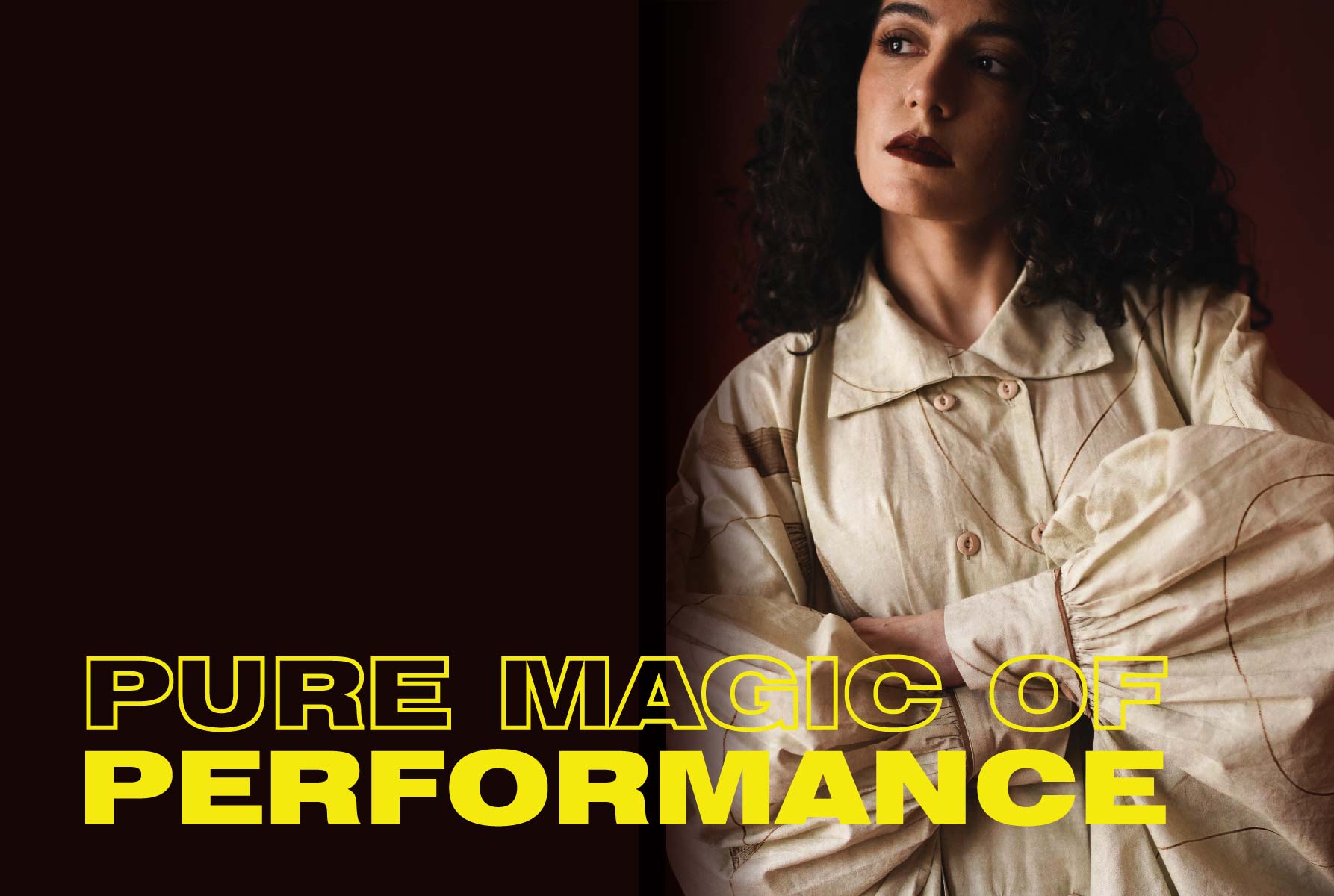Rasti Farooq of the most-talked about Joyland movie, opens up to Fashion Collection in a candid interview.

Fashion Collection: Tell us something about your journey to becoming a working actor.
Rasti Farooq: I was always drawn to being on stage and performing in front of a crowd. I remember it started with debates and plays in school, and then eventually branched out into doing theater plays in Lahore. I treated my love of performing as a hobby for the longest time though because I was also a good student and I think in my head I had to complete my education and “utilize” what I’d learnt–whatever that meant–before I could allow acting to take up more of my time. I don’t believe that thinking was my own, I think it sprouted subliminally in my head because of certain expectations, explicit and implicit, that were relayed to me about what success and ambition and passion ought to look like. Eventually I did a few short films and they only amplified my love for acting because it was a different world from theater and the stage but equally thrilling. Still, I couldn’t imagine taking the next big step–doing a feature film–because I couldn’t see myself in any of the features that came out of Pakistan. And I suppose that possibility was really just tied to finding the perfect script, which came in the shape of Joyland.
FC: What do you like about acting the most?
RF: So many things. It’s a really bizarre job brief if you think about it. You’re meant to read words that somebody else has written about some other person’s life and in doing so you’re supposed to make the viewer feel a particular feeling. But you can only do that if the words you’re saying feel, to the audience, like they mean something to you, the speaker. And it’s in that moment that this strange space erupts which is endless in possibilities which can be creative, intuitive, logical, illogical, intentional, unintentional, visceral, mundane and so on and so on, depending on the character you’re playing and the world that character occupies. I love how explorative and oftentimes frightening that space can be. You don’t know if what you’re doing is right, if it’s going to work, but you burrow as much as you can in search of the meaning of things that people say and do. I also love that acting will oftentimes require you to be a keen observer of other people and their lives. And then of course, there’s the pure and distilled magic of performing in front of a live audience, or in a good take in a film, especially if you’re lucky enough to have a good scene partners.

FC: Theatre or Cinema? And why?
RF: I couldn’t possibly choose even if you put a gun to my head. The irreversibility and immediacy of theatre, simply because of its inclusion of a live audience, is an unparalleled experience. I imagine for the audience too, as much as it is for the actor. It’s somewhat of a dialectical relationship in a way, theatre, because even if you’re not speaking to the audience directly, you’re still talking to them. And you wouldn’t be up there without them and they wouldn’t be here without you. It really is quite special, that relationship. The rehearsal process for theater is also very different from films–far more intensive, immersive, sometimes grueling. But always always fun. I quite enjoy that period. Cinema is much more dynamic and because of that I feel sometimes it’s a tad more transportive. And there’s also nothing like the feeling of being on a film set. A good set feels propulsive, cozy, electric really. All the parts of the filmmaking machinery come together right in front of your eyes and there’s a certain kind of trust building you have to partake in, with your director and your co-actors before you start shooting anything. And all of these things are just wildly exciting for me.
FC: In your opinion, how important is training in acting?
RF: I couldn’t say to be honest, I’ve never had any myself. I wish I’d had the means and the support to be able to go to a performing arts college somewhere abroad but I didn’t. And sometimes, very rarely, I’ll feel that thought creep up on me; what if I’d trained under so and so, and performed with so and so. But what I really believe is, acting is one of those rare crafts where you don’t need to have any kind of formal education or training. You need to be an excellent observer of life, you need to be able to grapple with the absurdities of the human experience, and it would also help to read a bunch of things (novels/plays/scripts/diaries) or watch a bunch of things, almost to study the work that’s been done before and why it did or didn’t make you feel something.

FC: What is your dream role that you aspire to do?
RF: I’d love to be in an adaptation of one of my top ten favorite books. That would be quite something. I’d also love to be able to do fight choreography for a role. That’s definitely high up on my list. I’d also love to play a character who’s deeply unlikeable. I think I’ve played too many likable characters so far so now I’m a little averse to them.
FC: What has been your experience with Joyland?
RF: Just the most terrific really. At the start of 2022, Joyland was a beautiful and brutally honest story that we’d all gotten together to stitch into a film. Then, a few months after that, it became the film that broke records around the world, an unparalleled piece of art in Pakistani storytelling and cinema. Now, it’s become more than just a film; it feels like a critical moment in our cultural and creative history that is redefining how we perceive ourselves and others, and how we want our art to reflect our truths—or not. But in spite of this, Joyland for me will remain a simple but breathtaking story about love, joy, belonging, and loss. And one of the most rewarding and cathartic experiences of my life, not just because of the people I got to make it with, but also because of the way that it’s been received all over the world.
FC: What makes Joyland so special?
RF: I think crucially it’s the fact that Joyland is able to confront the truths of our lives without making it melodramatic, bawdy, soppy, pretentious or slapstick-y,. It’s genuinely moving. Its humour is honest, its pain is honest. It isn’t a Public Service Announcement parading as a film. Or a vapid film pretending to be a constructive portrayal of a “social issue”. The merits of the film begin with its writing. And everything else—the art design, the acting, the cinematography, the score—just elevates that. And then of course, it’s the fact that even a story like Joyland that’s so grounded in the particulars of our world–the Punjabi dance theatre, the stifling lives of a lower middle class family in Gawalmandi Lahore–it has moved audiences around the world. So even in its particularity, it’s universal. And a story with those kinds of ingredients, for me, is quite something.
FC: How important is it to immerse the script in controversial waters?
RF: Not important at all, I’d say. I think the most important thing for a storyteller just ought to be the heart of the story they want to tell and they should know why they want to tell it. Everything else is secondary. And in the process of writing/filming/staging something, if your story ends up rustling feathers, then that’s okay too. It isn’t a requirement by any means, Some of the most moving films or shows that have ever been made were stories–simple, or grand–that had absolutely nothing to do with controversies. But I do think that if a storyteller decides to write something about things that we don’t like talking about, that we don’t acknowledge or appreciate, then they get to do that. And as audiences we can hope that it’s done sensitively, kindly, insightfully, maybe even creatively. And if a film or a story does manage to embrace some of those qualities, then that’s something to rejoice in. Because that film will inevitably allow audiences to traverse a space within their mind and bodies where they’ll discover something new, something to mourn, something to fight for, something to cherish and love.

FC: Is life always better than a nice movie?
RF: I’m not sure it’s wise to look at it as better or worse. Life’s life. And it can be pretty tough. And it can also be a whole lot of fun. It is what it is. And a film sometimes gets that across in its own way. Other times films can be a good way to get away from it all.
FC: Any advice you would like to give to the young people who are just starting their careers in showbiz?
RF: Be true to yourself and keep working. Build creative communities. Work with people who inspire or challenge you. Know that acting is painstaking work so treat it with that level of diligence, openness and respect.
FC: In your opinion, how difficult it is to establish yourself in the film industry?
RF: Maybe the toughest part of any film industry is writing good scripts. Writing stories that really mean something. Everything else happens after that. So to really establish anything in the film industry is heavily dependent on the stories that we tell. And that’s difficult. With good stories come hard working people and dedicated teams and then that earns loyal audiences. It doesn’t sound easy when we get down to it, does it?
FC: Describe yourself in three words.
RF: Books. Food. Dance.
FC: Are there things you want to do other than acting?
RF: I think most people have a list of things they’d love to do in life at some point. I’m really grateful that at this stage in my life, I get to do what I love best: act. But I’d also love to put life on hold so I can do other things that intrigue me. Like I’d love to host a show, preferably a radio show. I’ve wanted to do that since I was a kid. I’d also love to be able to write and possibly publish a collection of essays. Or write my own show. Or become a full-time dog trainer. Or become a professional dancer. Or teach. Just some of those things.


